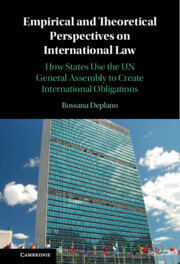 Empirical and Theoretical Perspectives on International Law
Empirical and Theoretical Perspectives on International Law Published online by Cambridge University Press: 21 July 2022
States routinely refer to the resolutions of the General Assembly in their domestic and international practice. One reason for such extensive reliance on resolutions is that the General Assembly has a broad mandate, which allows it to adopt resolutions on a wide range of issues spanning across areas as different as human rights protection and economic cooperation. Another reason is that, as decisions of the representative organ of the United Nations, resolutions are endowed with a certain degree of persuasive authority. Therefore, they seem naturally suited to make an impact on state conduct. At the same time, it appears that states rely more heavily on certain resolutions rather than others. In order to shed light on the normative implications of this observed practice, the analysis in the present study addressed three main issues: the concept of autonomy of the General Assembly from its member states, instances of attribution of different degrees of legal significance to resolutions by states in different contexts and the legal implications of such practices for the development of international law.
To save this book to your Kindle, first ensure [email protected] is added to your Approved Personal Document E-mail List under your Personal Document Settings on the Manage Your Content and Devices page of your Amazon account. Then enter the ‘name’ part of your Kindle email address below. Find out more about saving to your Kindle.
Note you can select to save to either the @free.kindle.com or @kindle.com variations. ‘@free.kindle.com’ emails are free but can only be saved to your device when it is connected to wi-fi. ‘@kindle.com’ emails can be delivered even when you are not connected to wi-fi, but note that service fees apply.
Find out more about the Kindle Personal Document Service.
To save content items to your account, please confirm that you agree to abide by our usage policies. If this is the first time you use this feature, you will be asked to authorise Cambridge Core to connect with your account. Find out more about saving content to Dropbox.
To save content items to your account, please confirm that you agree to abide by our usage policies. If this is the first time you use this feature, you will be asked to authorise Cambridge Core to connect with your account. Find out more about saving content to Google Drive.